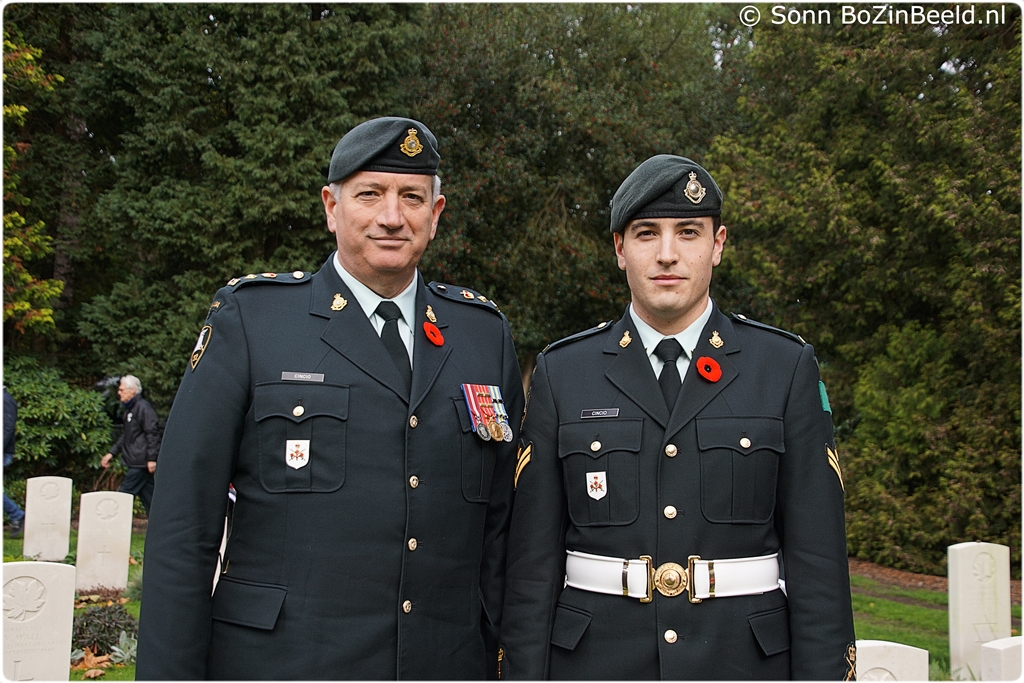Het was afgelopen vrijdag druk in de stad.
(English version below)
Eigenlijk gonsde het door de week al. Immers, 26 en 27 is het weekend van de herdenking 75 jaar bevrijding. Tal van geplande evenementen dus en prominent de aanwezigheid van Canadese soldaten. Ilse Tempelaars, communicatieadviseur van de gemeente Bergen op Zoom, wist me te koppelen aan een Canadese militair voor een interview. Dat werd een heel interessant gesprek.
Om 18:00 uur schoven twee personen aan bij de tafel in de Bourgondiër: Het waren Christopher Cincio en Walter Sendzik. De laatste is Burgemeester van St. Catharines, thuishaven van het Lincoln and Welland Regiment. De eerste is de Commanding Officer van dat regiment in de functie van Luitenant-Kolonel. Daarnaast was Peter de Graaf namens de gemeente Bergen op Zoom aanwezig.
Als eerste een stukje uitleg. Het Lincoln en Welland Regiment werd in 1863 opgericht als een bataljon vrijwillige soldaten met de naam: The 19th Battalion Volunteer Militia (Infantry), Canada. Deze groep infanterie had als doel het vaderland te beschermen. In 1936 kreeg het de naam The Lincoln and Welland regiment. Momenteel behoren ze tot de 32 Canadian Brigade Group. Het is dit regiment dat de bevrijding van onze stad Bergen op Zoom inleidde.
Vriendelijke ontvangst
Christopher Cincio is de zoon van de militair die met zijn tank de Grote Markt op reed. Hij heeft zijn vader opgevolgd in militaire dienst, evenals zijn eigen zoon dat inmiddels ook gedaan heeft. De hele groep arriveerde woensdag en zijn gelegerd in de sportzalen van het Rijks, samen met de soldaten van het South Alberta Light Horse Regiment. Luitenant-Kolonel Cincio kan er niet over uit, hoe perfect alles geregeld is en hoe vriendelijk de ontvangst is: ‘Er is echt aan alles gedacht. We hadden wifi, er lagen stekkerdozen gereed voor onze apparaten en zelfs het ontbijt was helemaal kosteloos voor ons geregeld door sponsoren, mensen van de Rotary en vrijwilligers. We worden echt als goud behandeld.’
Die behandeling gaat trouwens nog veel verder volgens hem: ‘Het is ongelooflijk hoe de herinnering hier levend gehouden wordt. We worden hier in Bergen op Zoom echt met alle honneurs bejegend. Ook op straat, mensen stappen op ons af en stellen vragen, tonen hun dankbaarheid. Het leeft hier veel meer dan bij ons in Canada. Behalve mensen die in het leger zitten, of daarbij betrokken zijn op een of andere manier, weten de gewone burgers niet zoveel. Het is voor hen dan ook allemaal moeilijk te bevatten.’
Verhalen moeten levend blijven
Christopher benadrukt hoe belangrijk het is dat de verhalen levend gehouden worden. Zo hebben alle cadetten tevoren uitleg gekregen. We grijpen in het verhaal gelijk terug op het bezoek van jonge Canadese cadetten in de maand juli van dit jaar. Ook toen zag je dat het Canadese leger hun oorlogsverleden levend houdt. Christopher maakt nog eens duidelijk dat er een bijzondere band met Bergen op Zoom is: ‘Het is ongelooflijk te zien hoe deze stad de gevallen soldaten eert, hoe de begraafplaats wordt bijgehouden. Ook hoe de mensen reageren en praten over dit stuk geschiedenis. Nu ook weer bij dit bezoek. Dat zien we nergens zo in deze mate. Dat is heel bijzonder.’
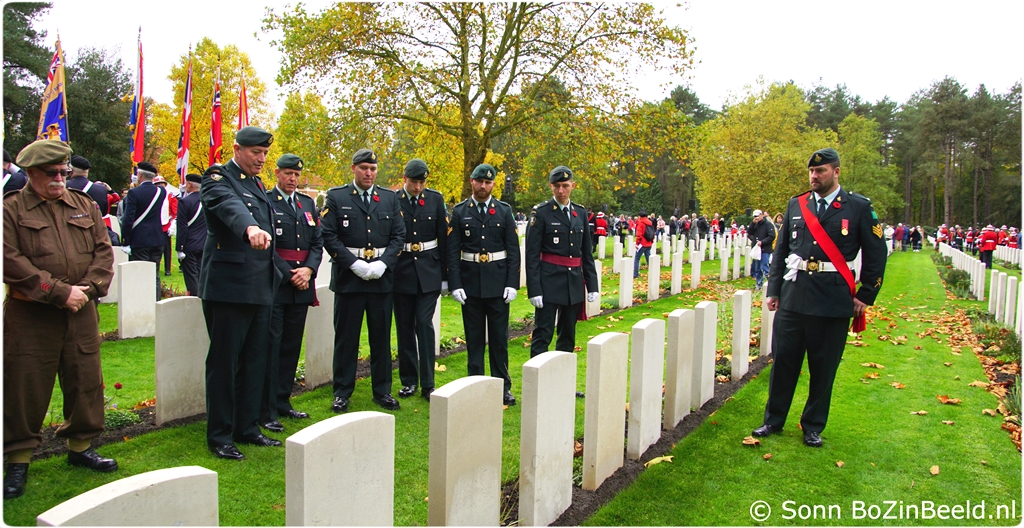
Voor hem zelf is het ook belangrijk. Hij volgde zijn vader op en op dit moment neemt hij zijn zoon mee om van diens opa’s verleden te laten proeven: ‘Deze week zijn we in het oorlogsmuseum in Zeeland geweest, heeft hij nog in een carrier gezeten, zoals een waar ook zijn opa nog in zat. Weet je, er is volgens mij nog 1 veteraan in leven. Dus juist nu is het belangrijk om die verhalen levend te houden. Als je mij nu vraagt, wat wil ik terugnemen naar Canada, dan zeg ik: herinneringen. Ik wil zoveel mogelijk herinneringen meenemen, opdat ik die weer aan de jongeren kan doorvertellen. En nog iets, als ik hier ben, dan heb ik het gevoel dat ik in de voetstappen van mijn vader loop.’ Je kunt de trots van het gezicht van Luitenant-Kolonel Cincio aflezen, de zoon van een soldaat die de 2e Wereld Oorlog beleefde, de vader van een zoon die nu van deze erfenis proeft.
Hij zou ook graag met nog meer militairen terugkomen, nog meer mensen dit stuk Canadees-Nederlandse geschiedenis tonen. ‘Helaas is dit onmogelijk. De kosten zijn behoorlijk hoog en die worden niet door onze regering vergoed. Wij hebben als Lincoln and Welland Regiment een fonds, daarnaast levert iedereen een persoonlijke bijdrage. Helaas kunnen we van dit alles niet iedereen faciliteren om hierheen te komen.
Weet je trouwens, in het Canadese militaire systeem is het regiment het hart. Dat zie je ook terug in onze kleuren (vlag en vaandel) die ons symbool vormt. Ook de eretekens van het strijdveld zie je hier op terug.’
Freedom of the City
Het gesprek richt zich nu op het defilé van zaterdag. ‘Ken je het verhaal van “Freedom of the City” ? Dit wordt gegeven aan een groep soldaten of een regiment door de stad. Als een stad het vertrouwen heeft dat een dergelijke groep zich binnen de muren van een stad begeeft. Dat ze daarbij wapens mogen dragen, hun kleuren, dat de band een parade mag houden. Het is een traditie die we met het defilé levend houden. De ceremonie ziet er als volgt uit”
- De soldaten marcheren de stad binnen tot op de Grote Markt
- Zij maken halt bij het stadhuis
- De bevelhebbers kloppen op de deur
- De burgemeester doet open, en laat hen binnen als hij hen vertrouwt
- Vervolgens leest hij een proclamatie voor met zijn toestemming
Jullie moeten dat herkennen, jullie stad had vroeger muren en stevige stadspoorten. Alleen die soldaten die jullie vertrouwden, werden binnen de stadsmuren gelaten.’
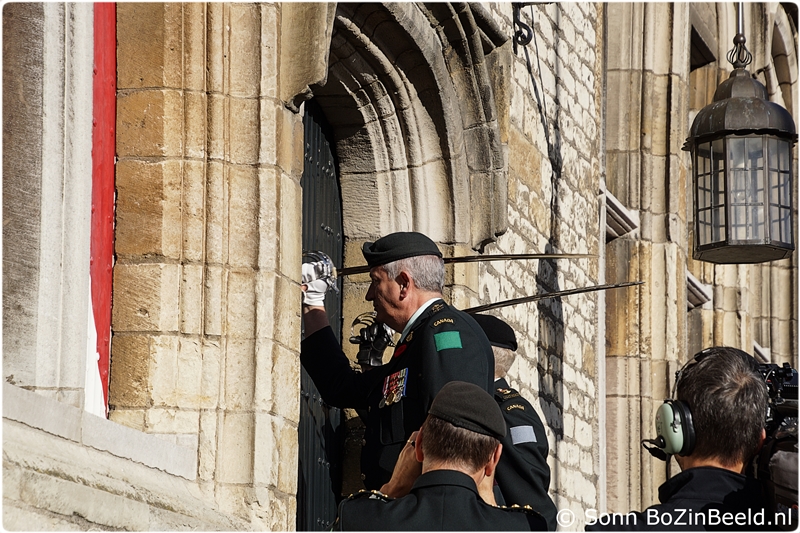
Veel verhalen
Het gesprek gaat verder en nu komen de verhalen pas echt los.
Zo was er een groep soldaten over de Zoom getrokken; de 8e Compagnie. Ze waren afgescheiden van hun eigen troepen door de vele Duitsers die bij de Lincolnbrug (oude brug over de Zoom) gepost waren. Er moest iemand weer door de vijandelijke linies sluipen om hulp te halen. Sergeant Charles Kipp was de soldaat die ongedeerd terug bij eigen troepen geraakte. Het leek een wonder, want ze hadden hem toch echt moeten spotten. Later bleek dat amper een dag tevoren de Duitsers een eigen officier hadden doodgeschoten. Bang als ze waren om weer zo’n fout te maken, had niemand een schot gelost.
Nog zo’n verhaal betreft The Story of the Toast.
De Canadezen Lambard en Kipp geraken tijdens een schermutseling in een kelder. Hier houden ze zich schuil voor de Duitsers, maar ze zijn niet de enigen. Een Nederlands gezin verstopt zich daar ook, ze staan doodsangsten uit. De vader die totaal in paniek is, wil toch iets doen. Dus opent hij een fles wijn en schenkt de mannen een glas wijn in en neemt er zelf ook in. Hij wil toasten maar de angst doet hem zo enorm trillen dat de helft van de wijn over de glasrand loopt. De soldaten hebben een vaste hand, waarop de vader vraagt waarom ze niet van angst trillen. Het koele antwoord luidt: ‘Wij zijn niet bang; wij zijn Canadees!’
De tijd vordert snel, helaas, want Luitenat-Kolonel C.F. Cincio is een erg gepassioneerd militair. Aangezien zijn vader tijdens de oorlog een Belgisch meisje leerde kennen en haar na de oorlog trouwde, heeft hij ook hier nog wat roots liggen. Zo heeft hij nog familie in België wonen. Zijn familie, de erfenis van zijn vader en vele andere Canadese soldaten, alles leidt hem telkens terug naar deze regio. Wat hem betreft, is dit bezoek dan ook zeker niet het laatste. ‘Ik wil alle verhalen levend houden, en wanneer ik er niet meer ben, dan is het aan mijn zoon om ze verder te vertellen.’
Met deze woorden nemen we afscheid. Inderdaad, opdat we maar nooit vergeten.
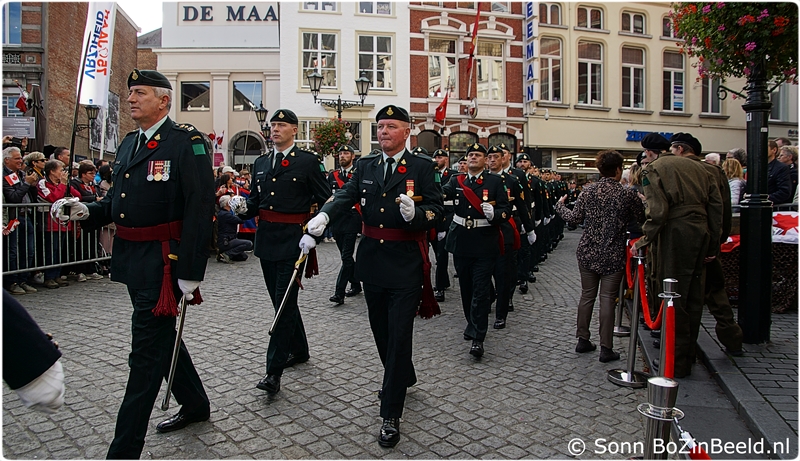
(Luitenant-Kolonel) aan het hoofd van het Lincoln and Welland Regiment)
(English version)
It is important that the stories of the soldiers continue to live
It was crowded last Friday in the city. Actually it already buzzed through the week. After all, 26 and 27 is the weekend of commemoration 75 years of liberation. Numerous planned events thus and prominent the presence of Canadian soldiers. Ilse Tempel, communications adviser to the municipality of Bergen op Zoom, managed to link me to a Canadian soldier for an interview. That became a very interesting conversation.
At 18:00 o'clock two people moved to the table in the Bourgondiër: they were Christopher Cincio and Walter Sendzik. The latter is mayor of St. Catharines, home to the Lincoln and Welland Regiment. The first is the Commanding Officer of that regiment in the function of Lieutenant colonel. Peter de Graaf was also present on behalf of the municipality Bergen op Zoom.
First a bit of explanation. The Lincoln and Welland Regiment was founded in 1863 as a battalion of voluntary soldiers named: the 19th Battalion Volunteer Militia (Infantry), Canada. This group of infantry was intended to protect the homeland. In 1936, it was named the Lincoln and Welland Regiment. Currently, they belong to the 32 Canadian Brigade Group. It is this regiment that led to the liberation of our city of Bergen op Zoom.
Friendly Welcome
Christopher Cincio is the son of the soldier who drove onto the Grote Markt with his tank. He succeeded his father in military service, as well as his own son who has now done so. The whole group arrived Wednesday and were stationed in the gymnasiums of the school The Rijks, along with the soldiers of the South Alberta Light Horse Regiment. Lieutenant-Colonel Cincio cannot believe, how perfect everything is arranged and how friendly the reception is: 'There is really thought of everything. We had wifi, there were plug boxes ready for our devices and even the breakfast was completely free for us arranged by sponsors, people of the Rotary and volunteers. We are really treated like gold. '
In fact, this treatment goes much further according to him: ' It is unbelievable how the memory is kept alive here. We are in Bergen op Zoom really met with all the honours. Also on the street, people approach us and ask questions, showing their gratitude. It is here much more alive than back home in Canada. Apart from people who are in the army, or are involved in one way or another, the ordinary citizens do not know that much. It is therefore all difficult for them to contain. '
Stories must remain alive
Christopher emphasizes how important it is that the stories are kept alive. For instance, all cadets have been given explanations beforehand. In our conversation we are right back on the visit of young Canadian cadets in the month of July of this year. Also then you saw that the Canadian Army keeps their war past alive. Christopher makes it clear that there is a special link with Bergen op Zoom: ' It is incredible to see how this city honors the fallen soldiers, how the cemetery is kept. Also how people react and talk about this piece of history. Now also at this visit again. We do not see that anywhere else in this degree. That is very special. '
For him it is also important. He followed his father and at this moment he took his son to discover his grandfather's past: "This week we have been in the War Museum in Zeeland, he sat in a similar carrier, as his grandpa did. You know, I think there is only 1 veteran alive nowadays. So therefor it is important to keep those stories alive. If you ask me now, what do I want to take back to Canada, then I say: memories. I want to bring back as many memories as possible, so that I can tell them again to the youngsters. And another thing, when I'm here, I feel like I'm walking in my father's footsteps. " You can read the pride of the face of Lieutenant Colonel Cincio , the son of a soldier who experienced the 2th World War, the father of a son who now tastes of this inheritance.
He would also like to come back with even more soldiers, to even more people show this piece of Canadian-Dutch history. ' Unfortunately this is impossible. The costs are quite high and they are not reimbursed by our government. As a Lincoln and Welland Regiment we have a fund, in addition, everyone contributes a personal contribution. Unfortunately, we cannot facilitate all to come here.
You know, in the Canadian military System the regiment is the heart. You can also see this in our colours (flag and banner), which is our symbol. You'll also see the decorations of the battlefield on these colours. '
Freedom of the City
The conversation is now focusing on Saturday's parade. ‘Do you know the story of "Freedom of the City"? This is given to a group of soldiers or a regiment by the city. If a city has the confidence that such a group is within the walls of a city. That they are allowed to wear weapons, their colours, that the band can hold a parade. It is a tradition that we keep alive with this parade. The ceremony looks like this:
- The soldiers marching into the city to the Market Place
- They make halt at the town hall
- The commanders knock on the door
- The mayor does open, and let them in if he trusts them
- He then reads a proclamation for his consent
You have to recognize that, your city used to have walls and sturdy city gates. Only those soldiers who trusted you were left within the city walls. '
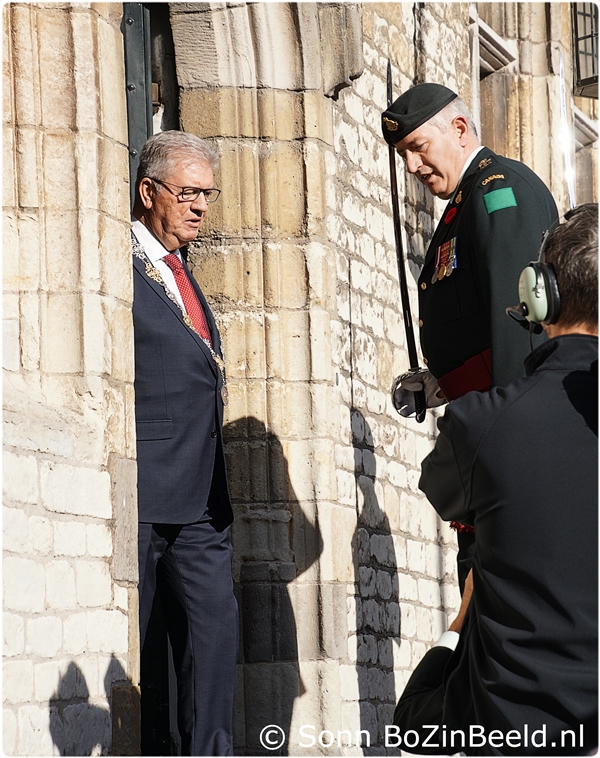
Many stories
The conversation goes on and now the stories really come.
So there was a group of soldiers sneaked over the Zoom (little river at Bergen op Zoom); The 8th Company. They were separated from their own troops by the many Germans who were posted at the Lincoln Bridge (old bridge over the Zoom). Someone had to sneak through the enemy lines again to get help. Sergeant Charles KIPP was the soldier who was unharmed back by his own troops. It seemed like a miracle, because they really had to spot him. Later it turned out that barely a day before the Germans had shot their own officer. Afraid if they were to make such a mistake again, no one had unloaded a shot.
Another such story is The story of the Toast.
The Canadians Lambard and Kipp get into a basement during a skirmish. Here they keep themselves hidden from the Germans, but they are not the only ones. A Dutch family is hiding there too, they are terrified. The father who is totally panicked, wants to do something anyway. So he opens a bottle of wine and gives the men a glass of wine and also takes one himself. He wants to toast but the fear makes him vibrate so enormously that half of the wine is spilled. The soldiers have a steady hand, on which the father asks why they do not tremble with fear. The cool answer is: ' We are not afraid; We are Canadian! '
Time is progressing quickly, unfortunately, because Lieutenant-Colonel C.F. Cincio is a very passionate soldier. Since his father met a Belgian girl during the war and married her after the war, he also has some roots here . He still has family living in Belgium. His family, the legacy of his father and many other Canadian soldiers, all lead him back to this region. As far as he is concerned, this visit is certainly not the last. "I want to keep all the stories alive, and when I'm no longer there, it's up to my son to tell them further."
With these words we say goodbye. Indeed, lets never forget.
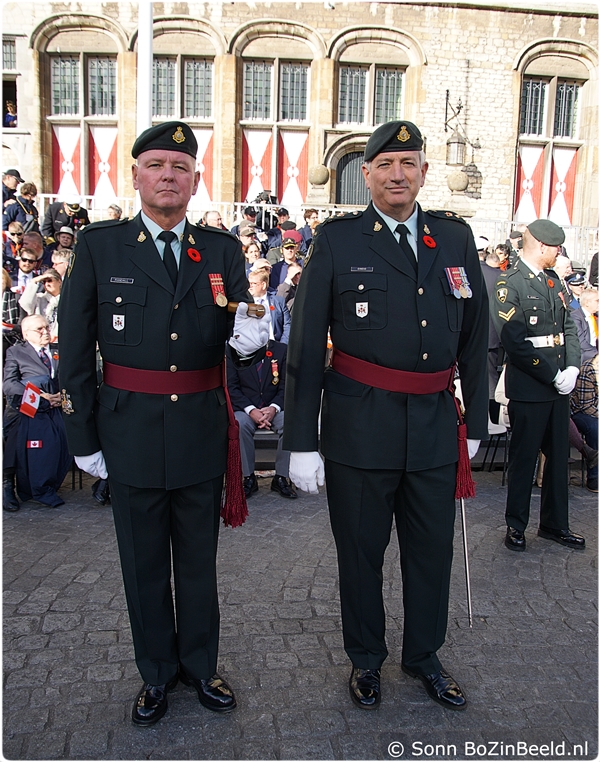
--------
After such stories I could not but put something on paper...
Heritage
The movie still moved, slowly
image for image ago
echo’s from the past
the colours more vague.
The sound already numbed
blown away, orphaned and lost
perished after having been born
in the storm called War.
Yet, even when shadows of heroes
vanish from our daily life
the stories shared to us
maintain the heritage endlessly.
So we never forget!













